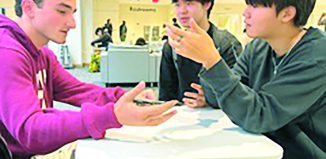D. None of the Above: Unspoken college advice
By Daniel Dunaief

You know that summer camp game where two or more teams line up with a spoon? The objective is to carry a tablespoon of water across a small lawn to the other side, dump whatever you can keep on the spoon into the cup on the other side, and race back with the spoon so that the next person can bring as much water as quickly as possible to your cup.
For me, parenting is about battling the urge to sprint at top speed, hoping that there’s at least some water to dump into the cup on the other side.
I had one of those moments when I wanted to share all the right pieces of advice for our daughter as we drove her to college. Would she even hear the pearls of wisdom I was trying not to drop from the spoon?
My first thought was to tell her that, “You get out of it what you put into it.” Of course everyone who passes the requisite classes gets a degree. What differentiates one set of experiences from another is the amount of energy, effort and dedication from the student. I scratched that one off the list because she’d heard it too many times before. If that lesson were going to make it into the cup, it had plenty of time to do so.
Then, it occurred to me to tell her to study smarter and harder, in that order. I wanted her to put in genuine effort — see the previous piece of unspoken advice — but I also felt that she needed to focus her efforts on specific chapters or concepts. Exams don’t tend to demand total recall of every word on every page in a textbook. Try to figure out, perhaps with some help from upper-class people or your resident adviser, what are the most important ideas for each class.
I considered telling her to appreciate and learn from her mistakes. I had suggested that homily in her academic life, on an athletic field and in her social interactions. I couldn’t possibly say that on the ride to college because her response, at best, would be some version of, “Daaaaaaaddd!” No, clearly, telling her to learn from her mistakes would be a mistake.
Maybe, just as I contemplated another recommendation, the clear skies on the drive ahead were a sign that I was on the right track. I wanted to tell her to get to know her professors, regardless of the size of the class. In fact, the larger the class, the greater the need to walk up to her teachers, introduce herself and express an eagerness to learn about a subject this person had spent a professional career teaching.
Maybe I should also tell her not to fall behind. Catching up becomes a regular struggle when the professor has moved away from the lessons you’re trying to process and commit to memory.
By the time we arrived at school, I hadn’t shared any of those words of wisdom or fortune cookie advice, depending on your perspective, because our daughter slept during much of the car ride. Carrying boxes, bins and bags up the stairs became the primary focus, as did trying not to sweat too profusely over everything I was lugging into her room.
As she was scrambling to figure out how to attach pictures of her friends to a wall, it was clear the timing wasn’t ideal to offer advice. Maybe it’s best this way: She’s now reached an age and a stage in life when she’s got to figure out how to fill her own cup with water.







